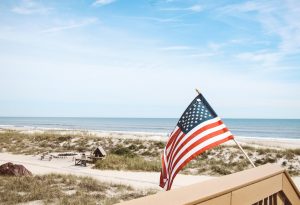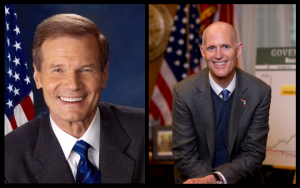October 30, 2018
Midterms and Science: Florida Senate
Posted by Laura Lyon
Midterms are just around the corner! There are an overwhelming number of critical races, so this week we will highlight a few that have major implications for science – mainly shake-ups in committee leadership. Read yesterday’s post on CA-48 here. Don’t forget to vote on 6 November! See if you’re registered here, and find your polling location here.
Today’s post focuses on the Florida Senate race and the Senate Committee on Commerce, Science & Transportation. This swing state is the third most populous in the U.S. and often dominates the airwaves during election season. Here, two seasoned politicians are vying for the title of Senator in what is becoming one of the closest and most expensive race of this election cycle.
Who’s in the race?
Incumbent Democratic Senator Bill Nelson faces off against the current Republican Florida Governor Rick Scott. Nelson has been a U.S. Senator for three terms and is fighting for his fourth. He served in the U.S. House of Representatives before entering the Senate and became the second sitting member of Congress to fly into space in 1986 after serving as a NASA payload specialist on Space Shuttle Columbia’s STS-61-C mission. Scott left a previous career in healthcare and successfully ran for Florida Governor in 2010. He cannot run for governor again due to governor term limits, and instead has decided to try to unseat Nelson who is currently the only statewide elected Democrat in Florida.
What’s the significance?
Nelson is currently the ranking member of the Senate Committee on Commerce, Science & Transportation, meaning he’d become chairman if Democrats take the Senate. Senator Maria Cantwell (D-WA) would assume the leadership position if Nelson loses his race, but she’s already the ranking member of the Committee on Energy and Natural Resources. Based on seniority, Senator Amy Klobuchar (D-MN) would be next in line if Cantwell kept her leadership role on Energy and Natural Resources.
Senator John Thune (R-SD) is currently the chairman of the Committee on Commerce, Science & Transportation but he is expected to run for Majority Whip if the Republicans retain the senate. This leaves Senator Roger Wicker (R-MS) as a likely successor for chairman.
What does this mean for science?
When Scott started his first term as governor in 2011, there were accusations of an unofficial policy within the Florida Department of Environmental Protection instructing employees to avoid the terms ‘climate change’, ‘global warming’ and ‘sustainability.’ Scott’s office has denied this. Once reports on this issue went public in 2015, Nelson introduced an amendment in Congress to prevent federal agencies from censoring official communications on climate change. For Florida politicians, the topic of climate change is hard to avoid as the state faces challenges such as sea-level rise, extreme storms, and algal blooms. Some question how Scott will prepare Florida for future disasters amplified by anthropogenic climate change, but he has taken actions such as signing legislation in 2015 requiring local governments to consider future flood risk from sea level rise in coastal planning.
Nelson has been a strong advocate for NASA and supports restoring funding to the space program. If he becomes committee chair, his priorities would be space and marine sciences, especially issues related to the effects of climate change on coasts. Most likely, Republicans will retain the Senate and Wicker, who was the lone vote against an amendment stating that climate change was real in 2015, will become chairman.
How are the candidates doing?
This race has been unbelievably close, with recent polls showing the candidates neck and neck. The Cook Political Report currently rates it a toss-up. Nelson has the incumbent advantage, but he faces a well-recognized, well-funded challenger. Though Nelson has also had a long career in politics, he struggles with name recognition, especially with Latino voters.
This race is expected to be the most expensive one of 2018. As of 25 October, $136 million has been spent; $70 million by the candidates and $66 million by outside groups. Trump won Florida by 2 points in the 2016 election, but Florida’s gubernatorial race has been making headlines and energizing Democratic voters, which would give Nelson a much-needed boost.



